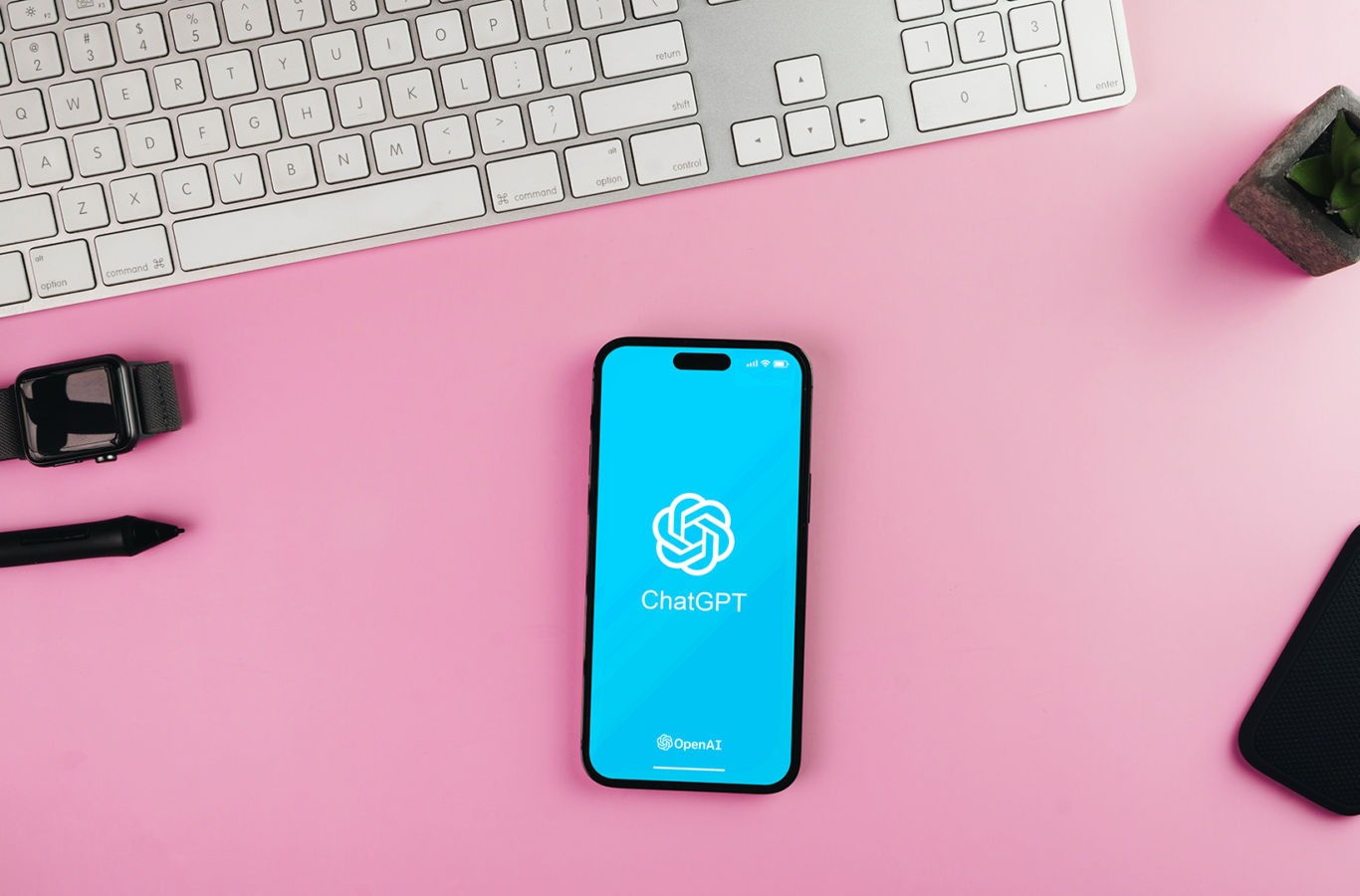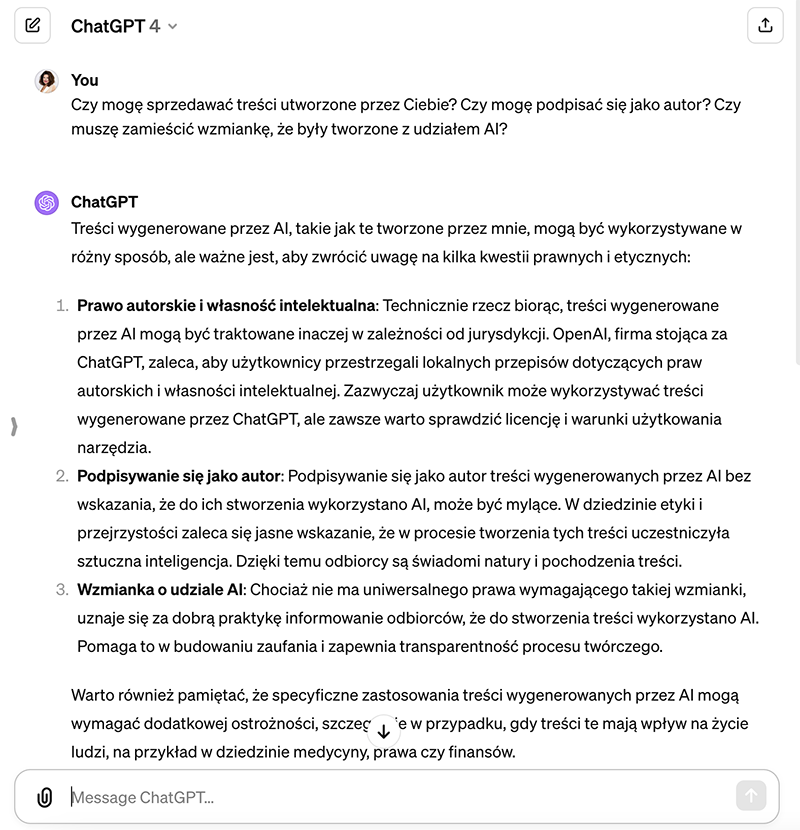Table of contents
I don’t think I need to introduce anyone to the technological masterpiece that is ChatGPT, thanks to which we can use artificial intelligence in our daily work.
However, is this tool perfect and without flaws? No, or at least not for now. However, ChatGPT does have its advantages that can help your business.
You’re probably wondering if ChatGPT can write a book for you or if ChatGPT writes posts on Instagram. From this article, you’ll find out what the answers to these questions are and learn lots of interesting facts about artificial intelligence.
What does artificial intelligence consist of?
AI, or artificial intelligence, is simply a powerful computer program tasked with machine learning..
Such a program processes huge amounts of data. The AI model, or algorithm, learns to recognize patterns and relationships in this data. It does this by repeatedly analyzing them and trying to predict or reproduce the results. For example, using texts, the algorithm learns which words often occur together and in what context they are used.
The model can then be used for various tasks, such as answering questions, translating languages or generating new texts. It does this by analyzing a question or task provided to it and using learned patterns to generate an answer.
The learning process I have described is made possible precisely by a technology called machine learning, which in turn is the result of so-called deep learning. Deep learning is based on “neural networks,” which are inspired by the way the human brain works and consist of layers of “neurons” that process information.
We have many different types of artificial intelligence. Some of them generate images, some perform technical tasks, and some generate texts. And just such a text generator is ChatGPT. Its very name, GPT, stands for Generative Pre-trained Transformer, which, as ChatGPT itself told me, means Generative Pre-trained Transformer.
And when you wonder who created Chat GPT, you might be surprised! A Pole, Wojciech Zaremba, who is one of the co-founders of OpenAI alongside Elon Musk, Sam Altman, Greg Brockman and Ilia Sutskever, had a big part in its creation.
What can ChatGPT be used for?
I will try to give you an idea of what it is worth using ChatGPT for in a small business for the moment. I myself use it a lot and it really makes my job easier. As you read, take note that this list will expand as ChatGPT continues to evolve. I will, of course, update this article then.
Customer service in an online store: There are special applications and plugins for WordPress based on ChatGPT that help you install a friendly chatbot on your own website. If you are a more advanced user or use a developer, you may be tempted to integrate directly with the OpenAI API.
Properly integrated and trained, ChatGPT will give the customer information about the status of the order, guide them through the process of complaining or returning a product and inform them about available promotions, and finally ask them to give feedback. It will also save a wealth of data for you about buyers’ preferences and behavior.
Writing posts for Facebook and Instagram: ChatGPT can help you a lot with social media. It will be great for describing services in posts, help you engage your followers and give you ideas for interesting topics.
Create roleplay scripts and short marketing videos: ChatGPT can create great scenarios for videos with your chosen target. With its help, you can even prepare an entire sequence of customer-engaging roleplays for Instagram or videos for TikTok. It will create everything from the title, text, as well as the selection of visual content to CTAs and hookups.
Marketing content generation: If you use good prompts and describe your business in detail, ChatGPT will create offers and write great content for your website with all the structure. It will also generate product descriptions with a presentation of their benefits and calls to action on the sales page. It will also help create landing page texts. However, always revise the content to match your brand’s unique language.
Employee Recruitment: You can integrate ChatGPT to conduct initial interviews with candidates by asking qualifying questions. Based on the answers, the system can automatically assess whether the candidate meets the basic requirements for further stages of recruitment.
Creating customer service scripts: ChatGPT can write sales scripts for your employees, as well as scripts for handling complaints or daily customer service itself.
Create e-book and tutorial plans: ChatGPT can create a structure for the tutorial you are writing and structure your ideas. It is also good for finding the substantive information you need for your writing, as long as it is not strictly expert.
Later in this article, however, I will write why I don’t recommend using it to write entire e-books.
Creating checklists and planners: the Generator is great at creating this type of short, uncomplicated content.
Blog articles low-quality: Let’s not kid ourselves, many companies have blogs that no one reads. However, they have a function – they serve the purpose of positioning the site in Google. Saturated with keywords, they generate traffic to the site. It is announced that Google intends to limit traffic for AI-generated articles, but it does not yet have effective tools to do so. When this changes, the positions of pages full of generative texts will drop dramatically. Also, count on the fact that AI-generated articles will not be as attractive to readers as those written by an expert – so create them only if they are only to draw traffic to the site.
Coding: ChatGPT is known for helping programmers and does a really good job of coding. However, you should always keep in mind that its work needs to be checked – it is just an algorithm that is still not perfect.
Whenever you use ChataGPT to collect customer data, include such information in your privacy policy – this is important from the point of view of RODO.
Remember, too, that you can’t just type a command into a command box: “Write me an advertisement”. You have to do it skillfully and effectively. For it to actually work and benefit you must write prompts, or commands, in a certain way. They must be accurate and precise.

What not to use ChatGPT for?
While ChatGPT can help a lot in day-to-day work, it also has limitations that should not be forgotten.
Writing e-books: There are different schools of thought on how to write e-books through ChatGPT. There are even courses on creating such products. This is, of course, a quick and easy way to create a guide, but I think it is more suitable for people who want to sell one guide and disappear, rather than build a long-term career. Why should you offer your audience something they can generate themselves? They want to pay you for your knowledge, your unique experiences, your style and your talent. Don’t make them into idiots. Besides, ChatGPT has a rather general knowledge and will not provide the same level as an expert in your field. You also risk copyright problems, which you will read about later in this article.
Writing books: Leaving aside the fact that writing a novel using AI is cheating on readers, it may simply be impossible. ChatGPT writes texts of several thousand characters with spaces in one speech. He can continue the taken up thread in the next one, but the further he gets, the more it loses its meaning. He begins to repeat himself, looping and creating more and more strange stories. At this point, ChatGPT is completely unsuitable for writing long texts. You can sort of skip it by creating chapters and subchapters, while it won’t be one neatly put together thread.
Expert blog writing: writing a decent expert blog requires specialized knowledge. Unfortunately, ChatGPT does not offer it. It won’t take into account your own experience or industry secrets. Surely, too, blog readers value your original style and have no desire to read something written in a language that is not very unique. ChatGPT is trained on the basis of texts found on the Internet, so it’s hard to expect it to be original in its style. Of course, it is possible to change this with very precise prompts, but they are so long and complicated that it is not worth the effort and it is easier to create the article yourself, instead of making multiple corrections in the generator’s creation.
Writing college and school papers: More and more people are offering to write master’s or bachelor’s theses for money. I think this should certainly be much more prosecuted than it actually is. After all, none of us would want to be operated on by a doctor for whom someone wrote college papers, right? Unfortunately, the practice is flourishing, and more and more of those who indulge in it are using ChatGPT to write papers. This is a road to nowhere, as AI-powered text detectors are already being developed (although not yet perfect, they are already getting better). Since ChatGPT learns from information found on the Internet, despite the fact that supposedly its texts are different, anti-plagiarism programs used at universities often show too high a level of “inspiration.” In addition, the bibliography that ChatGPT provides is often pulled from a finger, and it even happens that the sources provided do not exist.
As if that were not enough, a skilled lecturer will recognize the text written by ChatGPT from afar. The generator writes in such a peculiar way that someone who has dealt with it a lot will know its distinctive language.
If you’re counting on ChatGPT being less detectable after the next updates, you’re… counting. The entire European Union is working hard to develop a reliable detector of artificial intelligence in texts.
Creating specialized courses: If you are an online course developer, unfortunately ChatGPT can help you develop a program, but it won’t help with expert content creation. Its expertise is too small to be suitable for a valuable course for the audience.
Chatbots giving expert advice: While ChatGPT can be trained to answer customer questions and give advice on product selection, it’s hard to imagine that it should give medical, psychological or legal advice. There are still many shortcomings in the system, the advice could turn out to be false. Who will then take responsibility for it? You can’t play with people’s health or lives, and you can’t play with finances or legal principles.

Can content created by ChatGPT be sold?
Theoretically, there is no legal regulation of AI-generated content at this time. Some lawyers argue that ChatGPT-generated texts are protected by copyright. Others that ChatGPT’s content cannot be protected under copyright law, because only humans can be considered the creator. They believe that just as we use a piece of paper and pen as a tool to create a work, we can use ChatGPT in the same way.
So who really owns the copyright to the texts written by AI?
“Law of February 4, 1994 on Copyright and Related Rights: The subject of copyright is any manifestation of creative activity of an individual character, established in any form, regardless of value, purpose and manner of expression (work).”
However, is typing the prompt our creative activity? A certain approximation to creative activity is certainly the rewording of the generated text. The more, the better, so that the effect is unique.
ChatGPT creates from what it finds on the Internet inspired by the content it finds. In many cases, these are copyrighted works. As long as it is just inspiration, then everything is fine, but if the algorithm pastes fragments of texts, then a problem arises. And at that point, according to OpenAI’s terms of service, legal responsibility is transferred to the user.
So can you offer your audience paid content generated by ChatGPT?
For the moment, theoretically yes, and lots of people are doing it. However, there are a few things you need to keep in mind so that you don’t expose yourself to problems now or after the regulations go into effect:
- Rewrite the text to make it subject to your creativity
- Include a note that the text was created with the participation of artificial intelligence
- Run the text through an anti-plagiarism program to see if ChatGPT was inspired “too much”
Check if the law regarding the sale of AI-created content has changed
What about your copyrights for AI-generated content? Since they are not actually protected by copyright, your competitors can copy them from you with impunity! This is another important reason to rewrite your text before any publication.
Below you can see what ChatGPT told me about it:

ChatGPT is actually still crawling. In what direction will its development go? I don’t know the answer to this question yet. But certainly the emergence of artificial intelligence will irreversibly change the world. Some even claim that it is a breakthrough on the level of the emergence of the Internet.
One thing is certain – we can all benefit from ChatGPT in our businesses.









